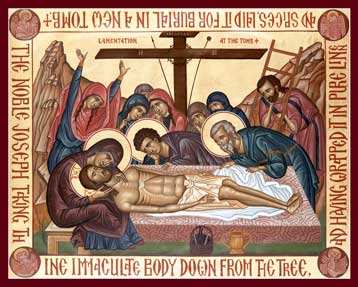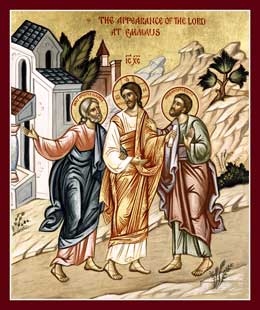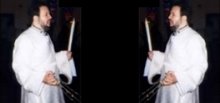 Next Sunday, we will celebrate the Sunday of the Cross. The two Sundays following, we will remember two great Saints: great specifically because they took up their crosses. Saint John of the Ladder, first -- because, of course, the means he describes for attaining the Kingdom of Heaven, the Ladder of Divine Ascent, is the Cross -- and then, Saint Mary of Egypt, about whom we will sing, in her troparion, "In you, O Mother, was carefully preserved what is according to the image, for you took up the Cross and followed Christ." Finally, we will come to Palm Sunday, when the Lord enters Jerusalem for no other reason than to take up His own Cross.
Next Sunday, we will celebrate the Sunday of the Cross. The two Sundays following, we will remember two great Saints: great specifically because they took up their crosses. Saint John of the Ladder, first -- because, of course, the means he describes for attaining the Kingdom of Heaven, the Ladder of Divine Ascent, is the Cross -- and then, Saint Mary of Egypt, about whom we will sing, in her troparion, "In you, O Mother, was carefully preserved what is according to the image, for you took up the Cross and followed Christ." Finally, we will come to Palm Sunday, when the Lord enters Jerusalem for no other reason than to take up His own Cross.The common thread, then, is the Cross.
“It's all about the Cross”, it appears. But why?
Let me answer by asking you a different question. (Really different!) Your favorite musician these days, whoever it is: how did you get to know them?
You hear a song.
For me, just as an example, it was I Can't Make You Love Me. I heard it on the radio 15 years ago, back in 1991. Had no idea who was singing it; I just knew it affected me, it got to me. It took a while to figure out that it was Bonnie Raitt singing it. So I bought the album it was on, Luck of the Draw. I liked everything on it. So I started buying her older stuff, going back to the beginning, to find out who she was, and what she'd done before.
I didn't meet her “in chronological order.” It started with a powerful encounter in the present: a song on the radio. Only then was there a reason to look back to the beginning. Bonnie Raitt had many albums out before the one with the song I heard. But the history, “the whole story”, as it were, only came later; everything started with what was in front of me, a song on the radio.
It works the very same way with God.
You start with what's in front of you – there is no other way. And what is in front of us is Jesus Christ, crucified and exalted. Listen to how St. Paul delivers the whole gospel message in just a few words:
 For I delivered to you first of all that which I also received: that Christ died for our sins according to the Scriptures, and that He was buried, and that He rose again the third day according to the Scriptures, and that He was seen by Cephas, then by the twelve. After that He was seen by over five hundred brethren at once, of whom the greater part remain to the present, but some have fallen asleep. After that He was seen by James, then by all the apostles. Then last of all He was seen by me also, as by one born out of due time. (1 Corinthians 15:3-8, emphasis mine)
For I delivered to you first of all that which I also received: that Christ died for our sins according to the Scriptures, and that He was buried, and that He rose again the third day according to the Scriptures, and that He was seen by Cephas, then by the twelve. After that He was seen by over five hundred brethren at once, of whom the greater part remain to the present, but some have fallen asleep. After that He was seen by James, then by all the apostles. Then last of all He was seen by me also, as by one born out of due time. (1 Corinthians 15:3-8, emphasis mine)Christ died, He was buried, He rose again according to the Scriptures, and He was seen. This is where we meet Christ -- the only place we can meet Christ: on the Cross, dying for our sins, buried, and risen on the third day. There is no other starting point; and there is no need for anything more:
 And I, brethren, when I came to you, did not come with excellence of speech or of wisdom declaring to you the testimony of God. For I determined not to know anything among you except Jesus Christ and Him crucified. (1 Corinthians 2:1-2, emphasis mine)
And I, brethren, when I came to you, did not come with excellence of speech or of wisdom declaring to you the testimony of God. For I determined not to know anything among you except Jesus Christ and Him crucified. (1 Corinthians 2:1-2, emphasis mine)The crucified and exalted Lord is What, or rather, Who we encounter in the Church -- and from that real and powerful encounter, and only from that, can we look backwards, at the "history" of God at work in the world, and forward, to the Kingdom which is to come. Only from that real and powerful encounter can we come to know God.
How does this work? Listen to how Luke and Cleopas come to know Christ -- which sounds weird, of course, since they were His disciples and, in theory, had known Him for years:
 Now behold, two of them were traveling that same day to a village called Emmaus, which was about seven miles from Jerusalem. And they talked together of all these things which had happened. So it was, while they conversed and reasoned, that Jesus Himself drew near and went with them. But their eyes were restrained, so that they did not know Him. And He said to them, "What kind of conversation is this that you have with one another as you walk and are sad?"
Now behold, two of them were traveling that same day to a village called Emmaus, which was about seven miles from Jerusalem. And they talked together of all these things which had happened. So it was, while they conversed and reasoned, that Jesus Himself drew near and went with them. But their eyes were restrained, so that they did not know Him. And He said to them, "What kind of conversation is this that you have with one another as you walk and are sad?"Then the one whose name was Cleopas answered and said to Him, "Are You the only stranger in Jerusalem, and have You not known the things which happened there in these days?"
And He said to them, "What things?"

And they said to Him, "The things concerning Jesus of Nazareth, who was a Prophet mighty in deed and word before God and all the people, and how the chief priests and our rulers delivered Him to be condemned to death, and crucified Him. But we were hoping that it was He who was going to redeem Israel. Indeed, besides all this, today is the third day since these things happened. Yes, and certain women of our company, who arrived at the tomb early, astonished us. When they did not find His body, they came saying that they had also seen a vision of angels who said He was alive. And certain of those who were with us went to the tomb and found it just as the women had said; but Him they did not see.They did not recognize Jesus in His resurrected body, that much is obvious. But I would argue that, to this point, for all the time they had been with him during His public ministry, Luke and Cleopas did not know him, they had no clue as to who He really was or what He had really done for them. And I'd be right:
Then He said to them, "O foolish ones, and slow of heart to believe in all that the prophets have spoken! Ought not the Christ to have suffered these things and to enter into His glory?" And beginning at Moses and all the Prophets, He expounded to them in all the Scriptures the things concerning Himself. Then they drew near to the village where they were going, and He indicated that He would have gone farther. But they constrained Him, saying, "Abide with us, for it is toward evening, and the day is far spent.
And He went in to stay with them. Now it came to pass, as He sat at the table with them, that He took bread, blessed and broke it, and gave it to them. Then their eyes were opened and they knew Him; and He vanished from their sight. And they said to one another, "Did not our heart burn within us while He talked with us on the road, and while He opened the Scriptures to us?"
So they rose up that very hour and returned to Jerusalem, and found the eleven and those who were with them gathered together, saying, "The Lord is risen indeed, and has appeared to Simon!" And they told about the things that had happened on the road, and how He was known to them in the breaking of bread. (Luke 24:13-35)He was known to them, eucharistically-speaking, in the breaking of His body. He was known to them only on the Cross.
We, too, start with Jesus Christ and Him crucified, and from this alone, from this powerful encounter, everything else proceeds; in His crucifixion and His exaltation, and in this alone, Jesus Christ is revealed as the Lord, risen indeed. It is the only place to start, and it is the ultimate place to start.
For in bearing His Cross, Jesus totally and completely reveals what it means to be God -- and what it means to say that “God is love.” (1 John 4:8) In other words, the love of God is fully realized and fully revealed when He takes our sins upon Himself and dies for us, He who was completely without sin, and not subject to death Himself. And Jesus Christ is fully realized and fully revealed as God, Who is love, when He rises from the dead.
In fact, it is our faith that the only way to truly know God and to know God's love is by looking at Jesus Christ crucified, which explains why the Jews, God's chosen and covenanted people, who had the Law and the Prophets – that is to say, they had the whole history -- came so close, but then missed something truly essential:
But their minds were hardened. For until this day the same veil remains unlifted in the reading of the Old Testament, because the veil is taken away in Christ. But even to this day, when Moses is read, a veil lies on their heart. Nevertheless when one turns to the Lord, the veil is taken away. (2 Corinthians 3:14-16)Why was this so hard for them? Why did they completely pass by the full revelation of God and His love when it was right in front of their eyes?
For Jews request a sign, and Greeks seek after wisdom; but we preach Christ crucified, to the Jews a stumbling block and to the Greeks foolishness, but to those who are called, both Jews and Greeks, Christ the power of God and the wisdom of God. (1 Corinthians 1:22-24)They failed to see, their eyes were veiled, because the Cross was a stumbling block to them. A scandal. An offense.
 But not to us. To us the Cross is precious and holy, the treasure of treasures. And we preach Christ crucified, fully realized and fully revealed only when He takes up His Cross: His Cross, which is, therefore, at the center of everything.
But not to us. To us the Cross is precious and holy, the treasure of treasures. And we preach Christ crucified, fully realized and fully revealed only when He takes up His Cross: His Cross, which is, therefore, at the center of everything.And we, as human beings made in His image and likeness, looking upon His Cross, are only fully realized, only fully revealed, when we -- in His image and likeness -- take up our own.


No comments:
Post a Comment